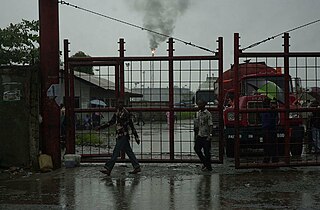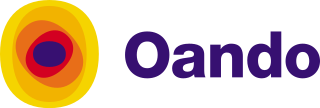
Chevron Corporation is an American multinational energy corporation predominantly specializing in oil and gas. The second-largest direct descendant of Standard Oil, and originally known as the Standard Oil Company of California, it is active in more than 180 countries. Within oil and gas, Chevron is vertically integrated and is involved in hydrocarbon exploration, production, refining, marketing and transport, chemicals manufacturing and sales, and power generation.

The Escravos River is a river in southern Nigeria, close to the city of Warri. "Escravos" is a Portuguese word meaning "slaves" and the area was one of the main conduits for slave trade between Nigeria and the United States in the 18th century. The Escravos is a distributary of the Niger River, it flows for 57 kilometres (35 mi), ending at the Bight of Benin of the Gulf of Guinea where it flows into the Atlantic Ocean. Chevron, a major US oil company, has its main Nigerian oil production facility at the mouth of the Escravos River. This oil terminal pumps approximately.

Nigeria is the second largest oil and gas producer in Africa. Crude oil from the Niger Delta basin comes in two types: light, and comparatively heavy – the lighter has around 36 of API gravity while the heavier has 20–25 of API gravity. Both types are paraffinic and low in Sulphur. Nigeria's economy and budget have been largely supported from income and revenues generated from the petroleum industry since 1960. Statistics as at February 2021 shows that the Nigerian oil sector contributes to about 9% of the GDP of the nation.

The Nigerian National Petroleum Company (NNPC) Limited is a state-owned oil company in Nigeria. Still a fully-owned government company, it was transformed from a corporation into a limited liability company in July 2022. NNPC Limited is the only entity licensed to operate in the country's petroleum industry. It partners with foreign oil companies to exploit Nigeria's fossil fuel resources. The NNPC, with an asset of $153B (USD), is the largest national oil company in Africa. The company boasts of extensive infrastructure and investment in the downstream, midstream and upstream of the Nigerian petroleum industry.

APA Corporation is the holding company for Apache Corporation, an American company engaged in hydrocarbon exploration. It is organized in Delaware and headquartered in Houston. The company is ranked 431st on the Fortune 500.

The current conflict in the Niger Delta first arose in the early 1990s over tensions between foreign oil corporations and a number of the Niger Delta's minority ethnic groups who feel they are being exploited, particularly the Ogoni and the Ijaw. Ethnic and political unrest continued throughout the 1990s despite the return to democracy and the election of the Obasanjo government in 1999. Struggle for oil wealth and environmental harm over its impacts has fueled violence between ethnic groups, causing the militarization of nearly the entire region by ethnic militia groups, Nigerian military and police forces, notably the Nigerian Mobile Police. The violence has contributed to Nigeria's ongoing energy supply crisis by discouraging foreign investment in new power generation plants in the region.

Petroleum extraction in the Niger Delta has led to many environmental issues. The delta covers 20,000 km2 (7,700 sq mi) within wetlands, formed primarily by sediment deposition. Home to 20 million people and 40 different ethnic groups, this floodplain makes up 7.5% of Nigeria's total land mass, and is Africa's largest wetland. The Delta's environment can be broken down into four ecological zones: coastal barrier islands, mangrove swamp forests, freshwater swamps, and lowland rainforests. Fishing and farming are the main sources of livelihoods for majority of her residents.
The Bonga Field is an oilfield in Nigeria. It was located in License block OPL 212 off the Nigerian coast, which was renamed OML 118 in February 2000. The field covers approximately 60 km2 in an average water depth of 1,000 metres (3,300 ft). The field was discovered in 1996, with government approval for its development given in 2002. The field began first production in November 2005. The field is worked via an FPSO vessel. The field produces both petroleum and natural gas; the petroleum is offloaded to tankers while the gas is piped back to Nigeria where it is exported via an LNG plant. The field contains approximately 6,000 MM barrels of oil.
Chanomi Creek is a body of water in the Niger Delta in Delta State, Nigeria.

Hydro Oil & Gas is a defunct division of Norsk Hydro that operated within the oil and gas industry. On October 1, 2007 it merged with Statoil to form the new corporation StatoilHydro.
Agbami Field is an oil field in Nigeria. Discovered in late 1998, it was the second major deepwater oil field discovered off the Niger Delta, the first being Bonga Field by Shell.

Oando Plc is a Nigerian multinational energy company operating in the upstream, midstream and downstream.
Escravos GTL is a gas to liquids (GTL) project based in Escravos region, Nigeria. It is located in the Niger Delta about 100 kilometres (62 mi) southeast of Lagos. The plant converts natural gas into liquid petroleum products.

Addax Petroleum was established in 1994 and since August 2009 has been a subsidiary of the Sinopec Group, one of the largest oil and gas producers in China, the biggest oil refiner in Asia, and the third largest worldwide. Addax Petroleum was an international gas and oil production and exploration company mainly focused on the Middle East, the North Sea, and Africa. Since its founding, the company has become one of the largest oil producers in West Africa.
Seplat Energy (Seplat) is a Nigerian independent oil and gas company listed on both the London and Nigerian Stock Exchanges with assets in the Niger Delta.

The Blacksands Pacific Group is an international oil and gas exploration and production and trading company headquartered in Los Angeles and Houston, with assets in North America, Asia and Africa. The company also transports, stores, purchases and markets crude oil and natural gas. The Chairman and CEO of Blacksands Pacific is Raheem J. Brennerman.
Izombe in the northeast of Niger Delta is an oil town in Njaba River basin, Imo State Southeastern Nigeria.
Aiteo is Africa’s largest privately-owned integrated energy company. It is involved in various aspects of the energy sector, including oil and gas exploration, production, refining, and marketing. Aiteo operates in West and Southern Africa.

OML 29 is also known as Oil Mining Licence 29. Oil Mining Licence OML is one of the two types of licences issued to oil producers in Nigeria "with validity periods ranging from 5 to 20 years respectively." OML29 is a large block located in the southeastern Niger Delta containing 11 oil and gas fields. OML29 stretches over an area of 983 square kilometres. It includes the Nembe Oil Field, Santa Barbara Oil Field and Okoroba Oil Fields. It also include related facilities like the Nembe Creek Trunk Line NCTL. A 100 kilometres long pipeline with a capacity of 600 thousand barrels per day.

The Niger Delta Avengers (NDA) is a militant group in the Niger Delta region of Nigeria. The group publicly announced their existence in March 2016.













